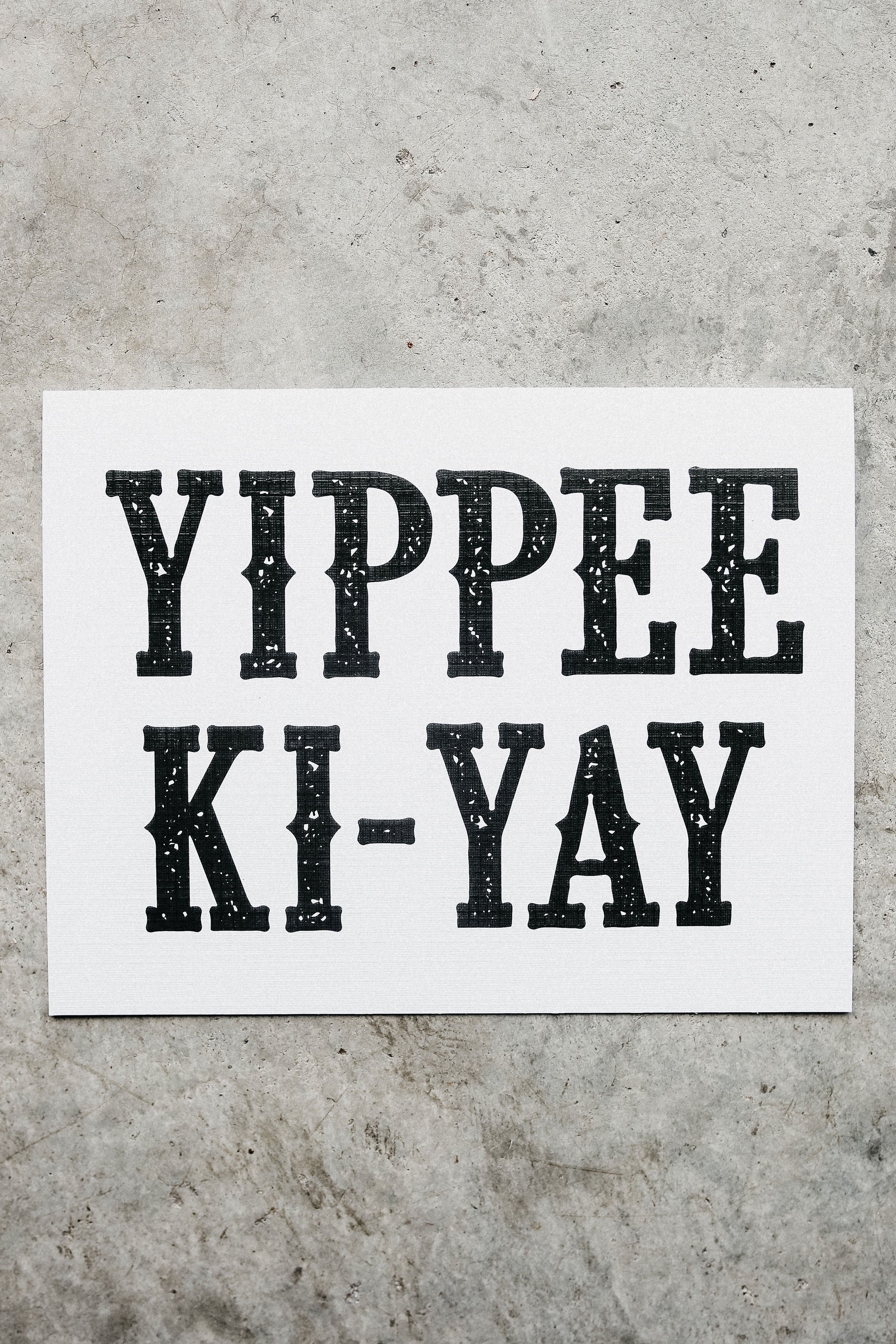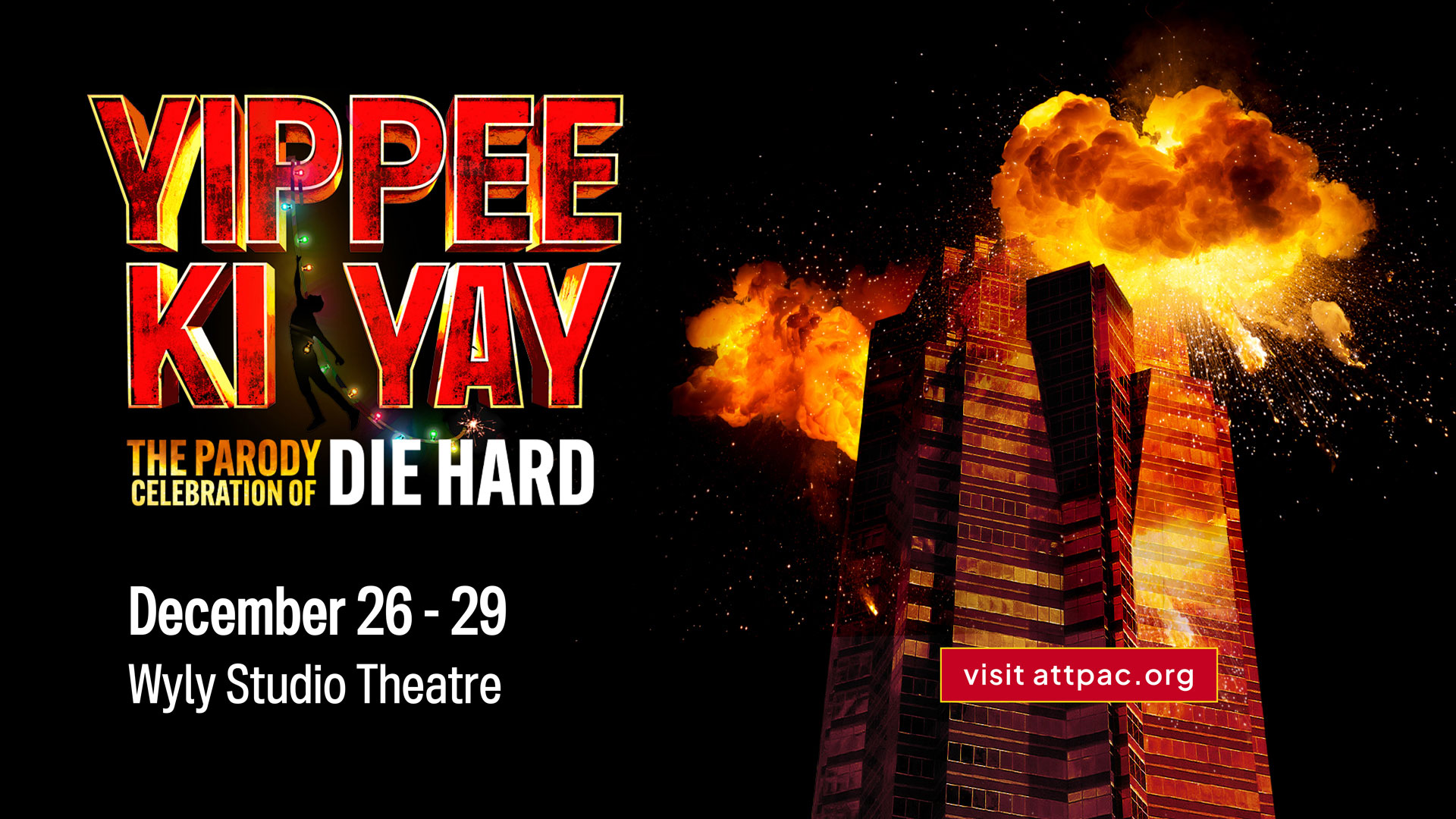Unveiling The Meaning And Impact Of "Yippee Ki Yay" Phrase
The phrase "yippee ki yay" has become a cultural icon that resonates with millions of people worldwide. Originating from the iconic Die Hard film series, this phrase carries a unique blend of excitement, humor, and action-packed energy. If you're curious about its origin, meaning, and significance, this article will provide a comprehensive exploration of everything related to "yippee ki yay."
From its humble beginnings in a holiday blockbuster to its current status as a widely recognized phrase, "yippee ki yay" has transcended its original context. The term has evolved into a symbol of resilience, cleverness, and wit, often used in various contexts beyond the movies. This article delves into its historical roots, cultural significance, and modern-day applications, ensuring a thorough understanding of its importance.
Whether you're a fan of action movies, a language enthusiast, or simply curious about pop culture phenomena, this article will cater to your interests. We'll explore the phrase's origin, analyze its meaning, and discuss how it has influenced popular culture. Let's embark on this journey to uncover the fascinating world of "yippee ki yay."
Read also:Kannada Movie Rulez2 The Ultimate Guide To Exploring Karnatakas Blockbuster Cinema
Table of Contents
- The Origin of "Yippee Ki Yay"
- What Does "Yippee Ki Yay" Mean?
- Cultural Impact of the Phrase
- Common Usage and Variations
- "Yippee Ki Yay" in Movies
- Pop Culture References
- Linguistic Analysis of the Phrase
- Parodies and Memes
- Historical Context and Evolution
- Conclusion
The Origin of "Yippee Ki Yay"
The phrase "yippee ki yay" first entered the public consciousness in the 1988 film Die Hard, starring Bruce Willis as NYPD detective John McClane. In one of the movie's most memorable scenes, McClane uses the phrase sarcastically while addressing the villain, Hans Gruber, played by Alan Rickman. This line became an instant classic, setting the stage for its widespread popularity.
Behind the Scenes
Interestingly, the phrase was not part of the original script. According to director John McTiernan, Bruce Willis improvised the line during filming, adding an authentic touch to McClane's character. This spontaneous creation highlights the importance of creative freedom in filmmaking and demonstrates how unexpected moments can become defining features of a movie.
Since its debut, "yippee ki yay" has been referenced in countless films, TV shows, and even video games, cementing its place in entertainment history.
What Does "Yippee Ki Yay" Mean?
At first glance, "yippee ki yay" might seem like a nonsensical phrase, but it carries a deeper meaning when analyzed in context. The term is often interpreted as a mix of excitement and sarcasm, reflecting McClane's resourceful and witty personality. The phrase can be broken down into its components:
- Yippee: An expression of joy or excitement.
- Ki: A filler word with no specific meaning, often used for rhythm.
- Yay: Another expression of excitement or approval.
Together, these words create a playful yet assertive tone, perfectly encapsulating McClane's attitude in the face of adversity.
Cultural Impact of the Phrase
Over the years, "yippee ki yay" has transcended its cinematic origins and entered mainstream culture. It has become a symbol of resilience, cleverness, and humor, resonating with audiences of all ages. The phrase's versatility allows it to be used in various contexts, from casual conversations to professional settings.
Read also:Moverulz Telugu 2025 A Comprehensive Guide To The Future Of Telugu Cinema
Why Does It Resonate?
Several factors contribute to the phrase's enduring appeal:
- Relatability: The phrase captures the universal experience of facing challenges with humor and determination.
- Uniqueness: Its quirky nature sets it apart from other expressions, making it memorable and distinctive.
- Pop Culture Influence: Its frequent appearances in media reinforce its significance and relevance.
As a result, "yippee ki yay" has become a cultural touchstone, frequently referenced in discussions about action movies and pop culture.
Common Usage and Variations
While the original phrase remains popular, various adaptations and parodies have emerged over the years. These variations often incorporate humor, wordplay, or cultural references to enhance their appeal. Some common examples include:
- Yippee Ki Yay Mother Russia: A nod to Cold War-era tensions, often used in political satire.
- Yippee Ki Yay Merry Christmas: A holiday-themed twist, emphasizing the phrase's connection to the Die Hard franchise.
- Yippee Ki Yay Mr. Falcon: A humorous reference to pop culture phenomena, showcasing the phrase's adaptability.
These variations demonstrate the phrase's flexibility and its ability to remain relevant in an ever-changing cultural landscape.
"Yippee Ki Yay" in Movies
Beyond its debut in Die Hard, "yippee ki yay" has made appearances in numerous films, often as a nod to the original movie. Directors and writers frequently use the phrase to evoke nostalgia or add a touch of humor to their work. Some notable examples include:
Die Hard Franchise
The Die Hard series consistently incorporates the phrase, reinforcing its connection to the films. Each installment finds new ways to reference "yippee ki yay," keeping the tradition alive for fans of the franchise.
In addition to the Die Hard films, other movies have paid homage to the phrase, using it as a tribute to one of cinema's most iconic lines. This cross-referencing highlights the phrase's influence on the film industry and its lasting impact on audiences.
Pop Culture References
From TV shows to social media, "yippee ki yay" has become a staple of modern pop culture. Its frequent appearances in various media underscore its significance and relevance in contemporary society. Some notable examples include:
- The Simpsons: The animated series has referenced the phrase multiple times, often in humorous contexts.
- South Park: Known for its satirical take on pop culture, South Park has used "yippee ki yay" to comment on societal trends.
- TikTok Challenges: The phrase has inspired numerous viral trends on the platform, showcasing its appeal to younger audiences.
These references demonstrate the phrase's versatility and its ability to connect with diverse audiences across different mediums.
Linguistic Analysis of the Phrase
From a linguistic perspective, "yippee ki yay" offers fascinating insights into language evolution and creativity. The phrase combines elements of traditional expressions with modern innovations, creating a unique linguistic hybrid. Its structure and rhythm contribute to its memorability and ease of use in conversation.
Phonetic Appeal
The phrase's phonetic qualities play a significant role in its popularity. The repetition of vowel sounds and the emphasis on syllables create a pleasing auditory experience, making it enjoyable to say aloud. This phonetic appeal enhances its usability and contributes to its widespread adoption.
Furthermore, the phrase's adaptability allows it to be easily incorporated into various linguistic contexts, ensuring its continued relevance in an ever-evolving linguistic landscape.
Parodies and Memes
As with many cultural phenomena, "yippee ki yay" has inspired countless parodies and memes. These creative adaptations often incorporate humor, satire, or social commentary, adding new layers of meaning to the original phrase. Some popular examples include:
- Meme Templates: Various meme formats have been created using the phrase, allowing users to express their thoughts and opinions in a humorous way.
- Video Parodies: YouTube creators have produced numerous videos parodying the phrase, often incorporating visual effects and sound design to enhance their work.
- Comedy Sketches: Late-night talk shows and comedy programs frequently use "yippee ki yay" as a punchline or recurring gag, highlighting its comedic potential.
These parodies and memes demonstrate the phrase's adaptability and its ability to inspire creativity in various forms of media.
Historical Context and Evolution
To fully understand the significance of "yippee ki yay," it's essential to examine its historical context and evolution. The phrase emerged during a time when action movies dominated the box office, characterized by their high-stakes plots and larger-than-life heroes. This cultural backdrop provided the perfect environment for a phrase like "yippee ki yay" to thrive.
Evolution Over Time
Over the decades, the phrase has evolved alongside changing cultural trends and technological advancements. Its adaptation to new media platforms and its integration into various forms of entertainment highlight its resilience and adaptability. As society continues to evolve, "yippee ki yay" remains a timeless expression of excitement and wit.
This ongoing evolution ensures the phrase's relevance in an ever-changing world, allowing it to maintain its status as a cultural icon.
Conclusion
In conclusion, "yippee ki yay" has become more than just a phrase; it has evolved into a cultural phenomenon with far-reaching implications. From its origins in the Die Hard franchise to its current status as a widely recognized expression, the phrase has left an indelible mark on popular culture. Its versatility, adaptability, and enduring appeal make it a testament to the power of language and creativity.
We invite you to share your thoughts and experiences with "yippee ki yay" in the comments section below. Whether you're a long-time fan or a newcomer to the phrase, your input is valuable in continuing the conversation. Additionally, explore our other articles for more insights into language, culture, and entertainment. Thank you for reading, and remember—yippee ki yay!
Article Recommendations


